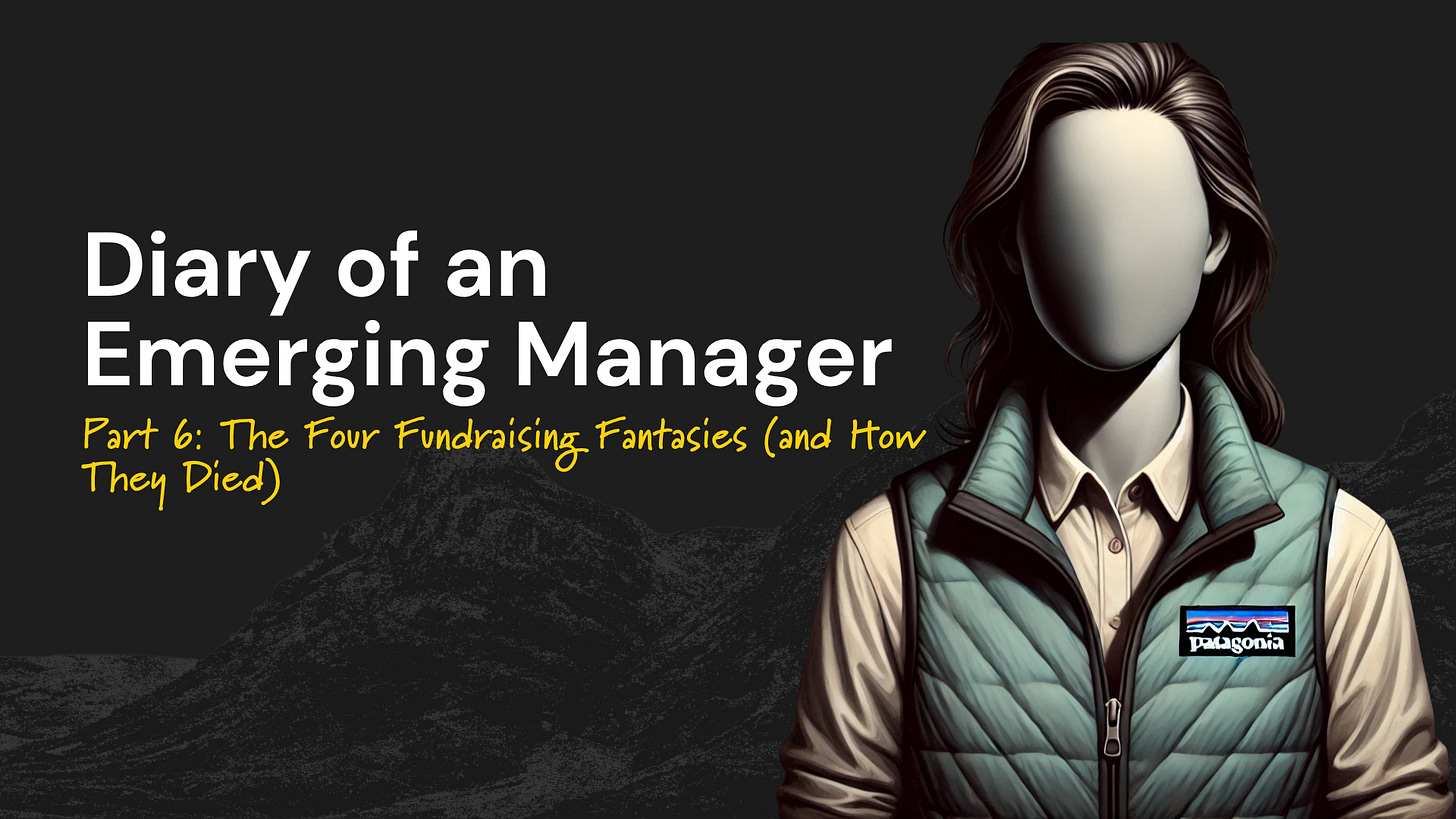Fred Destin's Part sermon, part existential slap in the face. And the 6th instalment of the emerging manager diary
On Power, Purpose & our Role in Shaping & Funding the Future -- Enjoy today's saturday read & listen
If you only watch one thing this week, make it Fred Destin’s talk.
Forget your typical startup spiel. Fred walked on stage at the EUVC Summit and gave us something far rarer: a mirror.
In a short half hour, he questions the very foundations we build on—power, truth, identity—and reminded us: this isn’t a rehearsal. We’re not just funding companies. We’re shaping culture, narratives, futures.
It was part sermon, part existential slap in the face. And all of us—VCs, LPs, founders—need to hear it.
So ask yourself: What is the quality of the conversation you’re having?
Then, shift gears and read the latest in our “Diary of an Emerging Manager” series. It’s raw, it’s honest, and it’s the dose of brutal reality-check that every aspiring VC needs. Together, these two pieces explore the spectrum of meaning in venture—from the 30,000-foot philosophical view to the gritty trenches of GP/LP heartbreak.
We’re here for all of it.
with 💖 David & Andreas
Living a Meaningful Life in Tech with Fred Destin (stride) at the EUVC EUVC Summit
“This isn’t a rehearsal.”
Fred opened with vulnerability: standing in front of his peers, in a room that lives and breathes venture, ready to say the uncomfortable things.
He asked us to zoom out—to consider the power we hold as people who don’t just fund companies but shape the narratives that shape the future.
“We sit in the cockpit alongside the founders. That’s where creation happens now. That’s our canvas.”
But with that power comes disorientation. Because the world we’re building into? It’s fragmented. Conflicted. Loaded with moral confusion.
On Truth, Power, and the Collapse of Shared Narratives
Fred pulled no punches.
“Historically, we had shared systems for truth. Religion. Philosophy. Math. But now? Everything’s been deconstructed. Lived experience replaced truth. Everything’s power.”
Welcome to the legacy of critical theory. Foucault, Derrida—ideas that once helped explain systems of oppression have now left us with... nothing to agree on.
“We’re left in a nihilistic landscape. Everything is a power struggle. There’s no shared center.”
And it’s not just academic. It unfolds in cycles of outrage, weaponized identities, and moral ambiguity. Tech doesn’t escape this, it amplifies it.
The Algorithm Doesn’t Care About Truth
“We thought more information meant more truth. It doesn’t.”
Truth, Fred reminded us, is costly. Outrage is cheap. And platforms optimize for what’s fast, not what’s real.
“A four-second tweet can destroy someone’s life. Investigative journalism takes months.”
Now, enter AI. Beautiful, powerful—and deeply destabilizing.
“We’re staring at it like it’s the sun or a cobra. We don’t know what it is yet. But it’s changing the rules faster than we can track.”
The Danger of Playing Games We Don’t Know We’re In
A warning:
You may think you’re being righteous. You may think you’re being helpful.
“But maybe you’re playing a social game. Maybe you’re being used. And maybe you don’t even know it.”
In a world where narratives shift daily, we often end up reinforcing the very dynamics we oppose.
“You want to call out a Nazi salute online? Be careful. You might just normalize the thing you hate.”
So Where Does That Leave Us?
In a word: Stewardship.
Fred closed with a challenge:
“This is the most powerful tool mankind has ever created. What the fuck are we doing with it?”
And finally, asking ourselves:
“What is the quality of the conversation we’re having?”
With ourselves. With each other. With our founders. With the world.
Because if we don’t ask that, the rest doesn’t matter.
Diary of an Emerging Manager - Part 6: The Four Fundraising Fantasies (and How They Died)
Editor’s Note – Andreas Munk Holm, co-founder of eu.vc
There’s a moment in every emerging manager’s journey when the initial high—the “we got a commitment!” dopamine rush—meets the cold, hard grind of reality. In this chapter, our anonymous author delivers a brutal, funny, and painfully relatable breakdown of what happens after that first win.
This post comes with a few reality checks—important ones. The kind that hit hard when experienced firsthand but are far less soul-crushing when absorbed through someone else’s blog. Consider it a public service: read now, suffer (slightly) less later.
Our author breaks down four core assumptions many first-time fundraisers walk in with—and how each one gets shattered. What starts as swagger (“clearly, we’re elite”) quickly descends into ghosting, gala imposters, and the slow, quiet heartbreak of unanswered emails. But beneath the frustration lies something more: the unmistakable pull of purpose.
This log isn’t just about disappointments—it’s about recalibrating. It’s about learning the game, finding joy in the pain, and still choosing to show up with conviction.
So, in the previous log I was talking about getting our first commitment—relatively easily. We thought we were acing life. Everyone who told us that fundraising is difficult? Clearly, they just didn’t have a good thesis. BUT we, the ELITE, were going to overcome any challenge and end up with an oversubscribed fund in no time.
That’s how it went. End of story—thanks for reading my blog.
I wish it had been like that. Still raising….
But actually, the next few logs will cover the most soul-crushing and emotionally devastating parts (so far) of our journey—experiences that made me question not just professional standards in the industry, but also the collective mutual respect of the human race.
Yep, I’m talking about finding investors. Let’s start with a classic: expectations vs. reality. I’ll cover the 4 most important ones for us.
Expectation 1: People who say they have money… actually have money.
Reality: Referring back to my earlier logs - especially my last one - it was already hard enough to figure out who in our network might even have LP potential. But we still managed to get a few (hence our initial success).
The real shocker? Some of the people we thought were bigshots - strutting around at gala events, posting about the sacred values of business angelhood—turned out to be, well… aspirational at best.
In about 80% of cases, they didn’t have the kind of money we were looking for. Sure, some of them were probably just too polite to say no, or maybe our fund just wasn’t their thing. But honestly, it felt like the dry season had reached them or they never actually had serious money - and that’s a bit concerning.
Conclusion: We need to meet new people with the right profile—and get access to their contact info, intros, LinkedIn, family tree, blood type, etc.
Expectation 2: If we spend hours writing relevant emails, people will at least reply and say “no.” Especially if we’ve met before, had a good chat, and they even encouraged us to reach out (that is a cruel one)
Reality: Nope. The reply rate is barely better than a “semi warm” outbound campaign from a seed-stage SaaS startup.
And honestly - I get it. I don’t always reply to those “10x your business with AI” emails either. But here’s my plea: If someone from the same industry reaches out - especially if you met - please at least say “no.” <3. We all started somewhere.
What really stings? Coming home from a big event, feeling like you just made new friends and strong leads—only to be ghosted like a Tinder date. The worst kind of hope is the one that slowly fades.
Lesson learned: This is a numbers game. At the EU.VC Summit, someone said you need 800–1,400 proper meetings to raise a fund.
Honestly, that’s probably true. Now we just have to figure out how to get 800–1,400 meetings when the reply rate is 10%.....
(On that note: What helped us the most? Attending conferences. Highly recommend it.)
We thought our thesis was so unique that we’d maybe need 100 meetings, tops. Which leads us to…
Expectation 3: A unique thesis is a good thesis, and people will be rushing to invest.
Reality: A unique thesis is… a challenge.
We teach storytelling and startup comms—and even for us it’s hard to explain our thesis in 30 seconds. There’s this old test: if your grandma gets your idea, it’s solid.
Well—my grandma gets it and can even pitch it back. But explaining it to an LP? That’s a different beast. Why? Because we’re bending industry norms and challenging preconceptions. If someone gets it, they get it immediately. But if they don’t? Oh boy. Good luck.
And it’s not just about explaining—it’s proving that you know what you’re talking about. That’s the tricky part when you are talking about something unconventional.
Also people might think:
We’re still working on that. And we’ll need clever ways to do it.
Expectation 4: Starting a VC fund is a lot of work and not enjoyable.
Reality: Yes, it’s a lot of work. Yes, it’s sometimes soul-crushing.
But not enjoyable? Hell no. We’re loving it.
Honestly, I’d rather meet with an LP who has a 10% chance of converting than a client who’s 70% likely.
You learn so much—from people, from the market, from yourself.
And let’s be real - it’s pretty badass to say: “I’m raising a XXM VC fund.” Cool, right?
I genuinely believe this can be someone’s IKIGAI—waking up every day to build something that could change lives.
I really wanted to end this on a positive note—even though we’re diving into some dark and discouraging truths. Next time, I’ll share how we approached our first GP/LP event and how we started prospecting.
Stay tuned. 💥
XoXo, Venture Whisperer (The VC Gossip Girl)
Upper East Side Ventures









Really glad to see that there are people out there like Fred Destin who see what others don't, and take responsibility for their actions as stewards! And also to the organizers who promote such discussions rather than suppress them 🙌